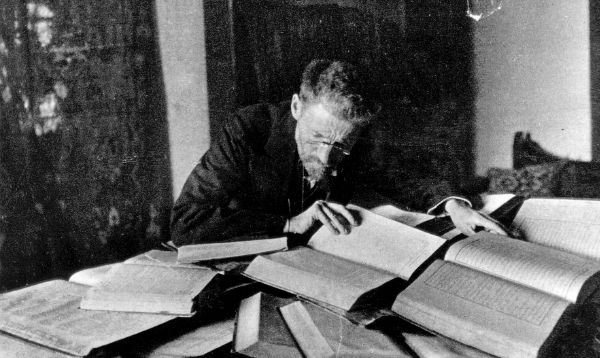Scroll down for English
בֵּן יְהוּדָה
בְּחוֹדֶשׁ יָנוּאָר זֶה אָנוּ מְצַיְּינִים 157 שָׁנָה לְהוּלַּדְתּוֹ שֶׁל אֱלִיעֶזֶר בֵּן יְהוּדָה, הָאִישׁ שֶׁבִּזְכוּתוֹ אָנוּ מְדַבְּרִים הַיּוֹם בִּשְׂפַת הַתַּנַ"ךְ גַּם בַּמַּכּוֹלֶת וְגַם בָּאוּנִיבֶרְסִיטָה. בֵּן יְהוּדָה אָומְנָם לֹא הִמְצִיא אֶת הַשָּׂפָה הָעִבְרִית, וְהַמִּילּוֹן שֶׁלּוֹ אֵינֶנּוּ שִׁימּוּשִׁי בְּיוֹתֵר, אַךְ אָנוּ חַיָּיבִים לוֹ תּוֹדָה גְּדוֹלָה. גַּדְלוּתוֹ הִיא בַּכָּךְ שֶׁדָּחַף וְקָרָא לָעַם הַיְהוּדִי לַחֲזוֹר לִשְׂפַת הָאָבוֹת, לִשְׂפַת הַמָּקוֹר שֶׁלּוֹ וּלְהִתְיַיחֵס לְעִבְרִית כְּאֶל שָׂפָה חָיָה וְנוֹשֶׁמֶת, בָּהּ אֶפְשָׁר לְהִשְׁתַּמֵּשׁ גַּם בָּעִידָּן הַמּוֹדֶרְנִי וְגַם לְעִנְיְינֵי חוֹל.
דַּרְכּוֹ שֶׁל בֵּן יְהוּדָה לֹא הָיְיתָה קַלָּה, וַחֲלוֹמוֹ גָּרַם לוֹ וּלְמִשְׁפַּחְתּוֹ יִיסּוּרִים רַבִּים וּבִידּוּד חֶבְרָתִי. הוּא הָיָה שָׂנוּא עַל הַיְּהוּדִים שֶׁגָּרוּ אָז בְּיִשְׂרָאֵל (רוּבָּם יְהוּדִים דָּתִיִים שֶׁגָּרוּ בְּיִשְׂרָאֵל מְסִיבּוֹת דָּתִיוֹת וְלָאו דַּוְוקָא צִיוֹנִיוֹת) בִּגְלַל רְצוֹנוֹ לַהֲפוֹךְ אֶת שְׂפַת הַקּוֹדֶשׁ לִשְׂפַת חוֹל וְהוּא הָיָה שָׂנוּא עַל הַשִּׁלְטוֹן הַעוֹתְ'מָנִי, מֵאַחָר וְהָיוּ לוֹ שְׁאִיפוֹת לְאוּמָנִיּוֹת אֲשֶׁר
בִּגְלָלָן הוּא יָשַׁב גַּם בְּכֶלֶא.
גַּם בְּחַיָּיו הָאִישִׁים הוּא לֹא רָוָוה נַחַת- הוּא עַצְמוֹ הָיָה חוֹלֶה בְּשַׁחֶפֶת, אִישְׁתּוֹ הָרִאשׁוֹנָה, דְּבוֹרָה, מֵתָה לְאַחַר שֶׁנִדְבֶּקָה מִמֶּנּוּ וְכָךְ גַּם שְׁלוֹשָׁה מִיַּלְדֵיהֶם. בְּנוֹ הָרִאשׁוֹן, בֵּן צִיּוֹן (שֶׁאַחַר כָּךְ שִׁינָּה אֶת שְׁמוֹ לְ"אִיתָמָר"), הָיָה "הַיֶּלֶד הָעִבְרִי הָרִאשׁוֹן". תּוֹאַר זֶה נִשְׁמַע מְכוּבָּד מְאוֹד אַךְ גַּם גָּרַר אִיתּוֹ הַרְבֵּה קְשָׁיִים. אִיתָמָר הֵחֵל לְדַבֵּר בְּגִיל מְאוּחָר מְאוֹד וְהָיָה מְבוּדָּד מֵחֲבֵרִים, בִּגְלַל שֶׁהוּא הָיָה הַיֶּלֶד הַיָּחִיד שֶׁדִּיבֵּר עִבְרִית. רַק עִבְרִית.
אֶפְשָׁר לוֹמַר כִּי בֵּן יְהוּדָה וּמִשְׁפַּחְתּוֹ, (שֶׁתָּמְכָה בּוֹ לְאוֹרֶךְ כָּל הַדֶּרֶךְ וְלָקְחָה חֵלֶק בְּמִפְעָלוֹ), מִצְטָרְפִים אַל שַׁרְשֶׁרֶת הַנְּבִיאִים בְּעָלֵי אֵשׁ הָאֱמוּנָה הַיּוֹקֶדֶת בְּעַם יִשְׂרָאֵל וּבַעֲתִידוֹ אֲשֶׁר הִקְרִיבוּ לְמַעַן חֲלוֹמָם אֶת חַיֵּיהֶם.
Ben Yehuda
 In the month of January we commemorate 157 years since the birthday of Eliezer Ben Yehuda, the man in whose merit we speak today the language of the bible in the corner shop and in University. Ben Yehuda whilst he didn't invent the Hebrew language and his dictionary wasn't the most useful, we are still obliged to give him huge gratitude. His greatness was that he pressured and called on the Jewish people to return to the language of their forefathers, to their original language and to connect to Hebrew as a living and breathing language with which is able to be used as well in the modern era and with secular subjects.
In the month of January we commemorate 157 years since the birthday of Eliezer Ben Yehuda, the man in whose merit we speak today the language of the bible in the corner shop and in University. Ben Yehuda whilst he didn't invent the Hebrew language and his dictionary wasn't the most useful, we are still obliged to give him huge gratitude. His greatness was that he pressured and called on the Jewish people to return to the language of their forefathers, to their original language and to connect to Hebrew as a living and breathing language with which is able to be used as well in the modern era and with secular subjects.Ben Yehuda's path was not easy and his dream caused him and his whole family great suffering and social isolation. He was loathed by the Jews that lived at that time in Israel (mostly the religious Jews who lived in Israel for religious reasons rather than Zionist reasons) because of his desire to change Hebrew from a holy language to a secular language. He was also hated by the Ottoman rule because of nationalist reasons; and for this he also ended up in prison.
Also in his private life he wasn't appeased- he, himself was sick with tuberculosis, his first wife Devora died after she caught it from him and in this manner so did 3 of their children. His firstborn Ben Zion (who later changed his name to Itamar), was the "first Hebrew boy" which when described like this sounds very honorable, but it also resulted with him having a lot of hardship. Itamar began to speak very late and he was lonely without friends because he was the only boy who spoke Hebrew, only Hebrew.
One can say that Ben Yehuda and his family (that supported him throughout his journey and took on a part of his work), join the chain of prophets with their burning fire of faith in the people of Israel and their future, who sacrificed their own lives for their dream.


No comments:
Post a Comment